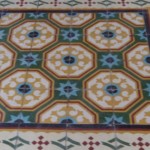
BY: HAYA SH. YASSIN
Haya is studying journalism at An Najah University in Nablus, West Bank. In January 2011, she will begin her M.A. in Filmmaking at Goldsmiths, University of London.
Here is her latest video from Nablus.
Life in the West Bank
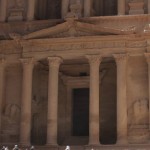
During a trip to Jordan and Egypt this past month, I remembered a few tips that make traveling, especially in developing countries, much easier.
10. Learn some of the local language.
“Hi, how are you,†are a great start. Knowing numbers and how to say “where is†will prove abundantly useful.
9. Be ready for your plans to change and the pace to be a bit slower.
You’ll still have a good time and your travel stories will be that much funnier.
8. Bring your own toilet paper and carry it with you everywhere.
It’s good for spills, runny noses and an ill-equipped bathroom.
7. Haggle, haggle, haggle — but don’t get flustered.
If you don’t want it, just say “No thanks†and move on. If you do want it, figure out what it’s worth to you and begin playing the haggling game.
6. Trust the locals — but ask more than one.
Case in point –passengers of the Queen Nefertiti ferry from Aqaba, Jordan to Nuweiba, Egypt cannot buy their ticket at the port as the Lonely Planet states. Just a few months ago, the policy changed. Tickets now must be bought at an office in Aqaba before passengers head to the port. Everyone knew this, but I doubted them all at first.
5. Once you begin arguing over the equivalent to $1, it might be time to stop haggling and relax for a bit.
Sit down and get yourself a tea, then start again with a clear head. Do you really need that wooden elephant anyway?
4. Sometimes a walk in the park is the best thing to do with your afternoon.
Free sights and smells and probably a handful of locals to join you. There might even be an ice cream truck.
3. It doesn’t matter if you overpaid for something you really love — as long as you could afford it.
Who cares if you paid quadruple what a local would pay if your purchase is meaningful to you!
2. Think beforehand about what you will do when people beg for money or food so you are prepared.
My rule of thumb – if I have food in my bag (and I usually do), I will give it away but I don’t give away money.
1. If there is a bathroom — use it.
Even if you have to hold your nose to get through it, your body will thank you later when you’re on a bumpy bus ride (please refer to #8 to avoid additional toilet trauma!).
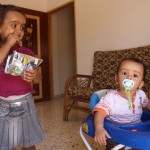
I spent many Sundays in Zababdeh since July 2010, celebrating with Fr. Firas and his congregation at St. George Melkite Church. Â Though the services were in Arabic, a few things were still familiar: the rhythm of prayers, the passing of peace and the children staying occupied by giggling and playing games in the back of the church. Â I quickly became accustomed to a service filled with rose-flavored incense, sermons I couldn’t understand and communicating in semi-sign language.
Below are a few of my favorite memories from Zababdeh.
To see my other stories from Zababdeh go to:
Sweatshop in Zababdeh only choice for some women
Get your hands dirty in Zababdeh
Experience the Holy Land with the Living Stones
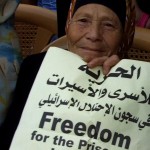
 When I hear the cadence of a drum squad, my heart skips a beat remembering my days in marching band at Dallastown High School. I loved marching through the parking lot to the football field to the beat of the school’s cadence.
When I hear the cadence of a drum squad, my heart skips a beat remembering my days in marching band at Dallastown High School. I loved marching through the parking lot to the football field to the beat of the school’s cadence.
Today, while walking through downtown Nablus, I heard the enticing sound of drums coming from the main square. I quickly changed my afternoon plans and hastened to the square, where I found myself in the midst of a Freedom Rally. Everyone was holding signs protesting Palestinian imprisonment in Israeli jails.
Children from many different schools were marching around the square in their uniforms. Mothers held framed photographs of their imprisoned sons. Music played and a stage hosted a few speakers. Downtown Nablus was packed like figs in a basket and the place was thumping with energy.
As I weaseled my way through the crowd to capture videos, I noticed something different about the subjects of my photos. Usually people give me strange looks when I ask to make a video of them. Sometimes they ask, “why?†Today, the women holding Palestinian flags and photographs of their sons looked me in the eye and nodded, as if to say what many in Nablus have said before, “Take this photo and show it to everyone you know.â€
Please watch the video clips from the rally in Nablus today.
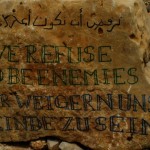
Today I sat in an auditorium full of Nablusi’s and Internationals, all watching the film To Shoot an Elephant, about the Israeli siege on Gaza. To my right, was my friend Ayyash, an activist who lives in Balata Camp. He translated some things for me and, having seen the movie a few times before, predicted some of the most horrific scenes as I shook with tears.
Watching a movie about Gaza while in the West Bank is surreal. The Palestinians sitting next to me cannot go to Gaza, and it would be extraordinarily difficult for me to get in. They are blocked by highways they cannot use, randomly erected checkpoints, machine guns wielded by 18-year-old Israeli’s with dreadlocks, an enormous wall, an identity card that clearly delineates where they are and are not allowed to go.
Today Netanyahu announced that the moratorium on settlement building would not be extended. I heard Palestinians talk about whether this would bring a third intifada. I heard about escalated violence. I felt the walls surrounding the people I love close around us.
Their land has slowly been taken away for years. My country has helped fund this. And now, though America is the top funder of the Israeli occupation, we seem to believe we can lead peace talks between Israel and Palestine. Â I wait in anticipation from the West Bank.
I have witnessed the occupation.
Palestinians have a different colored license plate than Israeli’s. The white plates can only drive on designated roads. The yellow plates can go anywhere. This is an occupation.
The other evening my friend pointed out the Mediterranean Sea in the distance. “We cannot go there, of course,†she said. Another friend remembered going there back in 1998. Though it’s about 2 kilometers away, Palestinians do not have access to the coast. This is an occupation.
I went to dinner at a friend’s house and watched olive trees burn. Settlers had set fire to them. The Israeli army drove by and did nothing. This is an occupation.
Since I’ve been here, four residents of Iraq Burin, a village a few minutes from Nablus, have been arbitrarily arrested. Two of them young men, and two of them village council members. The people in this village are farmers. They have lived there for years. Israeli’s have stolen their land, burned their trees, and recently killed two of the young men in the village (16 and 19).  This is an occupation.
One of my 16-year-old students was late for class because a surprise checkpoint was erected on the way from her home to school. This is an occupation.
Yesterday my boyfriend had to run away from soldiers. This is an occupation.
One of my friends was arrested last week for being affiliated with Hamas. He’s in a PA prison in Nablus, but I don’t know when he’ll get out. Maybe, hopefully, in a few days. This is an occupation.
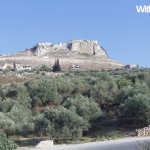
IRAQ BURIN —  On September 24, 2010 at 4:30pm, two villagers from Iraq Burin, a village near Nablus in the West Bank, were arrested by Israeli soldiers.  A checkpoint was erected at the entrance to the village in the morning of the same day.
In response to these arrests and the killing of two young men by Israeli soldiers in March 2010, Iraq Burin is launching a website:Â www.iraqburin.wordpress.com.
The soldiers identified the two men, Iman Qadous, 45, and Yousef Qadous, 50, both village council members, from a photo taken during one of the weekly peaceful demonstrations held in Iraq Burin since November 2009, protesting Israel’s confiscation of their land.
The soldiers said they were arresting the two men for having attended the demonstration.  Villagers do not know where the men were taken or for how long they will be gone.
In March 2010, two villagers, Mohammed Qadous, 16, and Usaid Qadous, 19, were killed with live ammunition when Israeli soldiers entered the village after the weekly demonstration.
Read the detailed report about the killings filed by the UNESCO Chair on Human Rights, Democracy and Peace at An-Najah University.
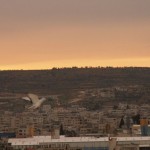
We may not currently have the might of the Israeli army nor the power of traditions confining us in certain roles, however, we know that one woman standing behind another in a line of solidarity is a force more powerful than both.
Dear friends and supporters of At-Tuwani village,
We would like to invite you to support a force more powerful than violence: the voices of Palestinian women. In late November 2010 , Humanity Together will host Keifah Addera and her husband Nasser on a speaking tour in Italy. Keifah will be speaking about the experiences of women in At-Tuwani as they nonviolently resist both the Israeli occupation and sexism. We hope that you will consider financially supporting this exciting project.
The people of At-Tuwani have often told their allies that the most important way we can support their struggle is to share their stories in our own communities. Keifah Addera, the organizer of the At-Tuwani Women’s Cooperative, is a powerful voice uniquely able to speak about the resistance of Palestinian women. While in Italy, Keifah will speak about the effect of the Israeli occupation and settler violence on women and children in Tuwani as well as the women’s cooperative’s work for justice and gender equality. Keifah’s husbandwill speak about his experiences as a prisoner in Israeli jail after being arrested for his participation in nonviolent demonstrations. Keifah and Nasser will present at the annual Italian Pax Christi peace conference as well as other public meetings in Rome, Trento, Ravenna, and several other locations.
Few Tuwani residents are as experienced in speaking with visitors as Keifah. She often hosts groups in Tuwani and has a rare talent for creating relationships with the people she meets. For this reason we are excited by the opportunities for building international support and women’s solidarity that this trip will provide. We are trying to raise 2,500 euros to cover the cost of flights, visa procedures, lodging, transportation in Italy, and food expenses. To donate, follow this link to our Pay Pal. Thank you so much for your support
In solidarity,
Read more about the folks in At Tuwani.

Click here to read:
Report of the international fact-finding mission to investigate violations of international law, including international humanitarian and human rights law, resulting from the Israeli attacks on the flotilla of ships carrying humanitarian assistance.
Summary
This report was prepared by the fact-finding mission established by the Human Rights Council in resolution A/HRC/RES/14/1 of 2 June 2010 to investigate violations of international law, including international humanitarian law and human rights law, resulting from the interception by Israeli forces of the humanitarian aid flotilla bound for Gaza on 31 May 2010 during which nine people were killed and many others injured.
The report sets out background information relating to the interception of the flotilla as well as the applicable international law.
The fact-finding mission conducted interviews with more than 100 witnesses in Geneva, London, Istanbul and Amman. On the basis of this testimony and other information received, the Mission was able to reconstruct a picture of the circumstances surrounding the interception on 31 May 2010 and its aftermath. The report presents a factual description of the events leading up to the interception, the interception of each of the six ships in the flotilla as well as a seventh ship subsequently intercepted on 6 June 2010, the deaths of nine passengers and wounding of many others and the detention of passengers in Israel and their deportation.
The report contains a legal analysis of facts as determined by the Mission with a view to determining whether violations of international law, including international humanitarian and human rights law, took place.
The fact-finding mission concluded that a series of violations of international law, including international humanitarian and human rights law, were committed by the Israeli forces during the interception of the flotilla and during the detention of passengers in Israel prior to deportation.